Holistic Care on Aboriginal and Torres Strait Islander
VerifiedAdded on 2023/06/13
|11
|2471
|156
AI Summary
This paper is reflecting on the Holistic care for Aboriginal and Torres Strait Islander as defined by NACCHO Constitution. It also discuss the barriers that prevent current mainstream healthcare system from meeting the holistic health needs of Aboriginal and Torres Strait Islander peoples. The paper also critically discusses how individual nursing professionals can become better advocates for Aboriginal and Torres Strait Islander people.
Contribute Materials
Your contribution can guide someone’s learning journey. Share your
documents today.
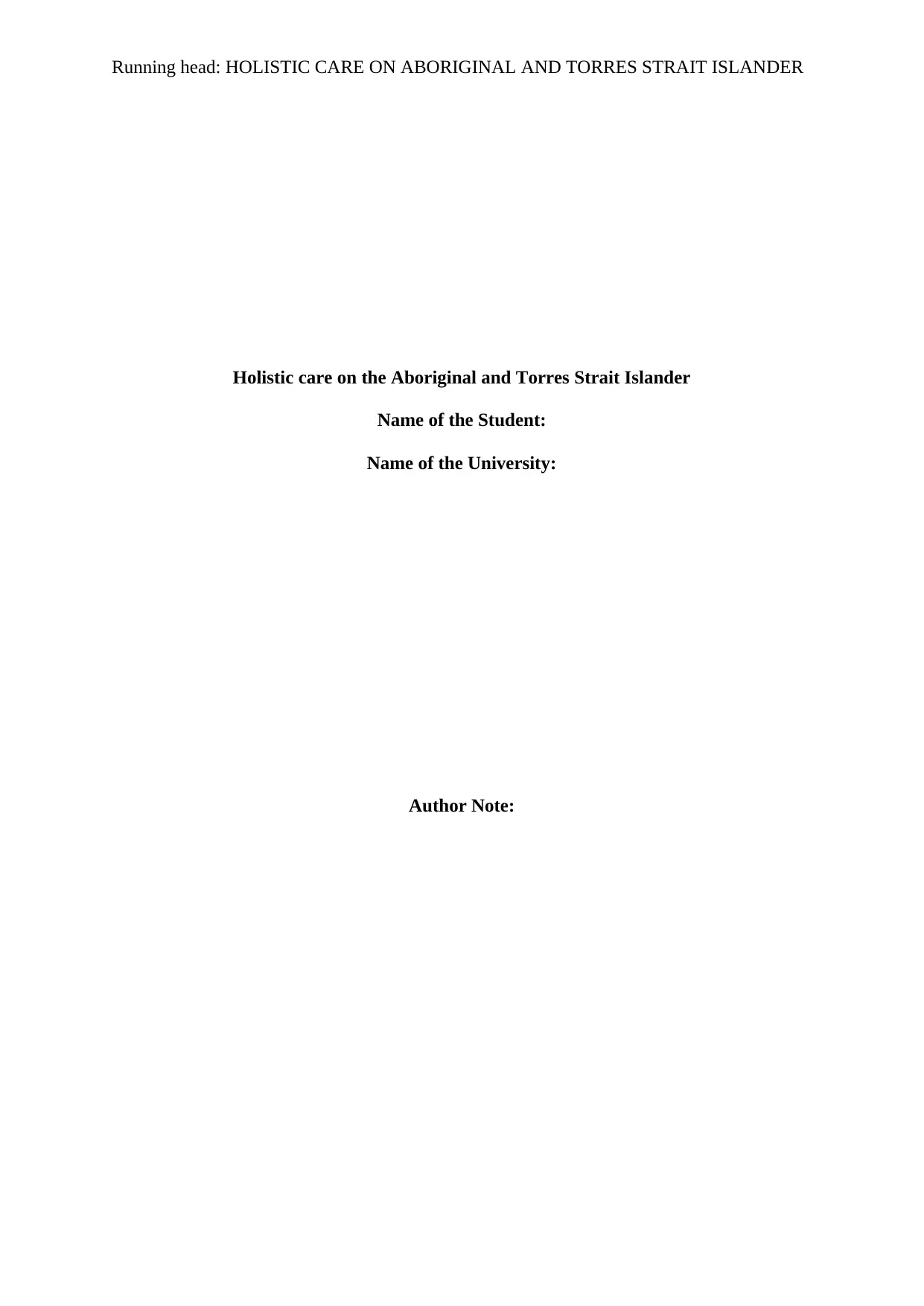
Running head: HOLISTIC CARE ON ABORIGINAL AND TORRES STRAIT ISLANDER
Holistic care on the Aboriginal and Torres Strait Islander
Name of the Student:
Name of the University:
Author Note:
Holistic care on the Aboriginal and Torres Strait Islander
Name of the Student:
Name of the University:
Author Note:
Secure Best Marks with AI Grader
Need help grading? Try our AI Grader for instant feedback on your assignments.
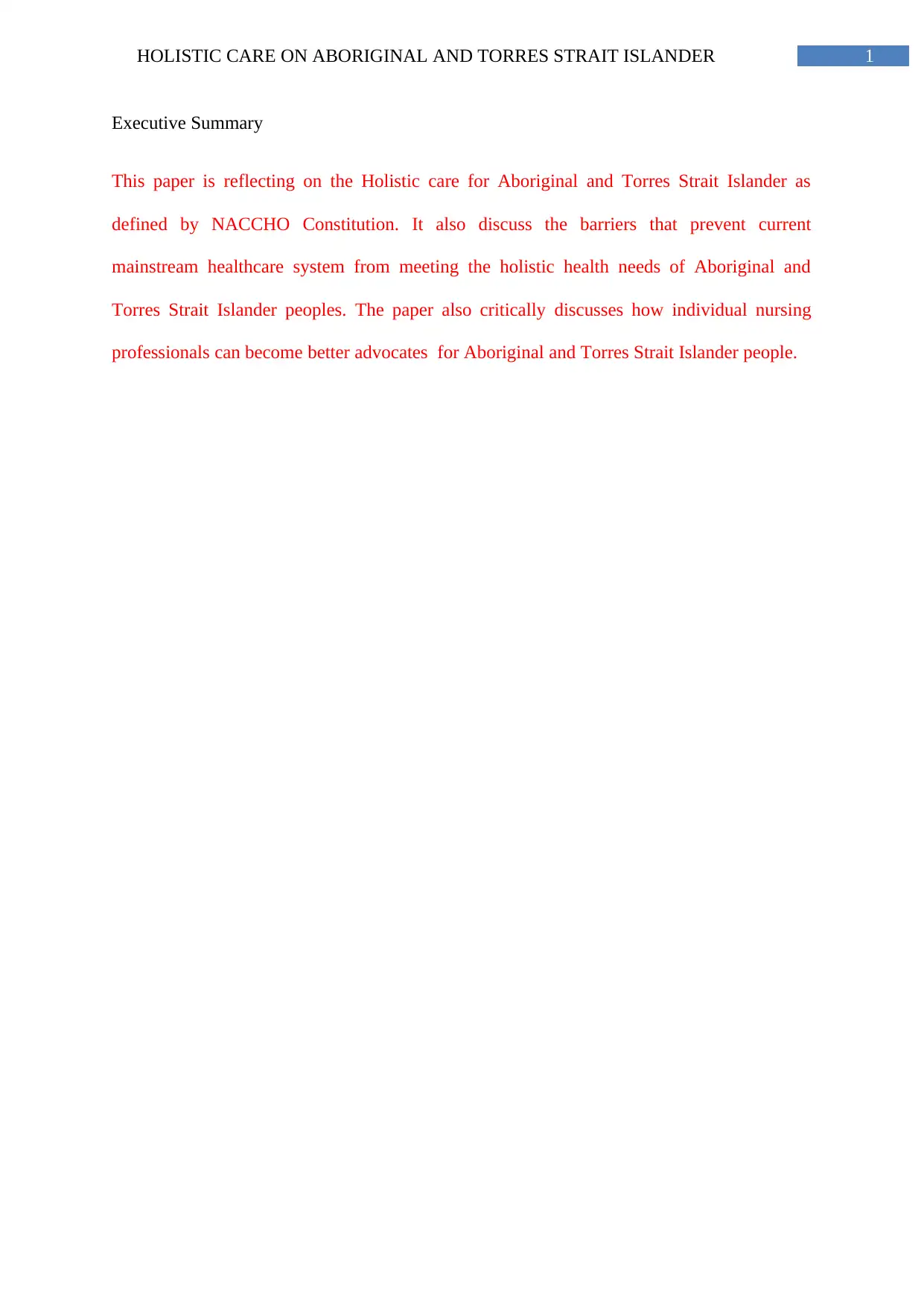
1HOLISTIC CARE ON ABORIGINAL AND TORRES STRAIT ISLANDER
Executive Summary
This paper is reflecting on the Holistic care for Aboriginal and Torres Strait Islander as
defined by NACCHO Constitution. It also discuss the barriers that prevent current
mainstream healthcare system from meeting the holistic health needs of Aboriginal and
Torres Strait Islander peoples. The paper also critically discusses how individual nursing
professionals can become better advocates for Aboriginal and Torres Strait Islander people.
Executive Summary
This paper is reflecting on the Holistic care for Aboriginal and Torres Strait Islander as
defined by NACCHO Constitution. It also discuss the barriers that prevent current
mainstream healthcare system from meeting the holistic health needs of Aboriginal and
Torres Strait Islander peoples. The paper also critically discusses how individual nursing
professionals can become better advocates for Aboriginal and Torres Strait Islander people.
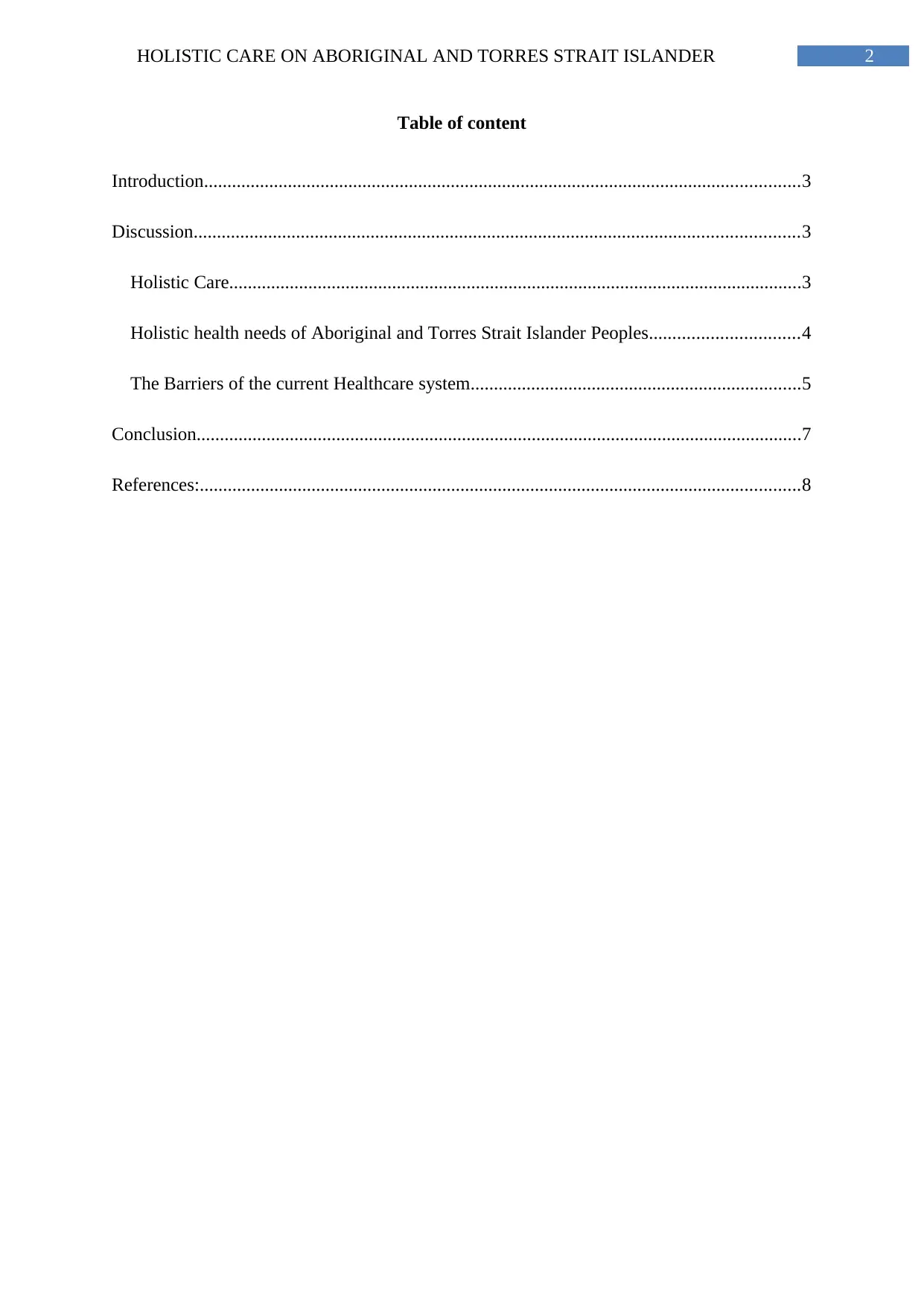
2HOLISTIC CARE ON ABORIGINAL AND TORRES STRAIT ISLANDER
Table of content
Introduction................................................................................................................................3
Discussion..................................................................................................................................3
Holistic Care...........................................................................................................................3
Holistic health needs of Aboriginal and Torres Strait Islander Peoples................................4
The Barriers of the current Healthcare system.......................................................................5
Conclusion..................................................................................................................................7
References:.................................................................................................................................8
Table of content
Introduction................................................................................................................................3
Discussion..................................................................................................................................3
Holistic Care...........................................................................................................................3
Holistic health needs of Aboriginal and Torres Strait Islander Peoples................................4
The Barriers of the current Healthcare system.......................................................................5
Conclusion..................................................................................................................................7
References:.................................................................................................................................8
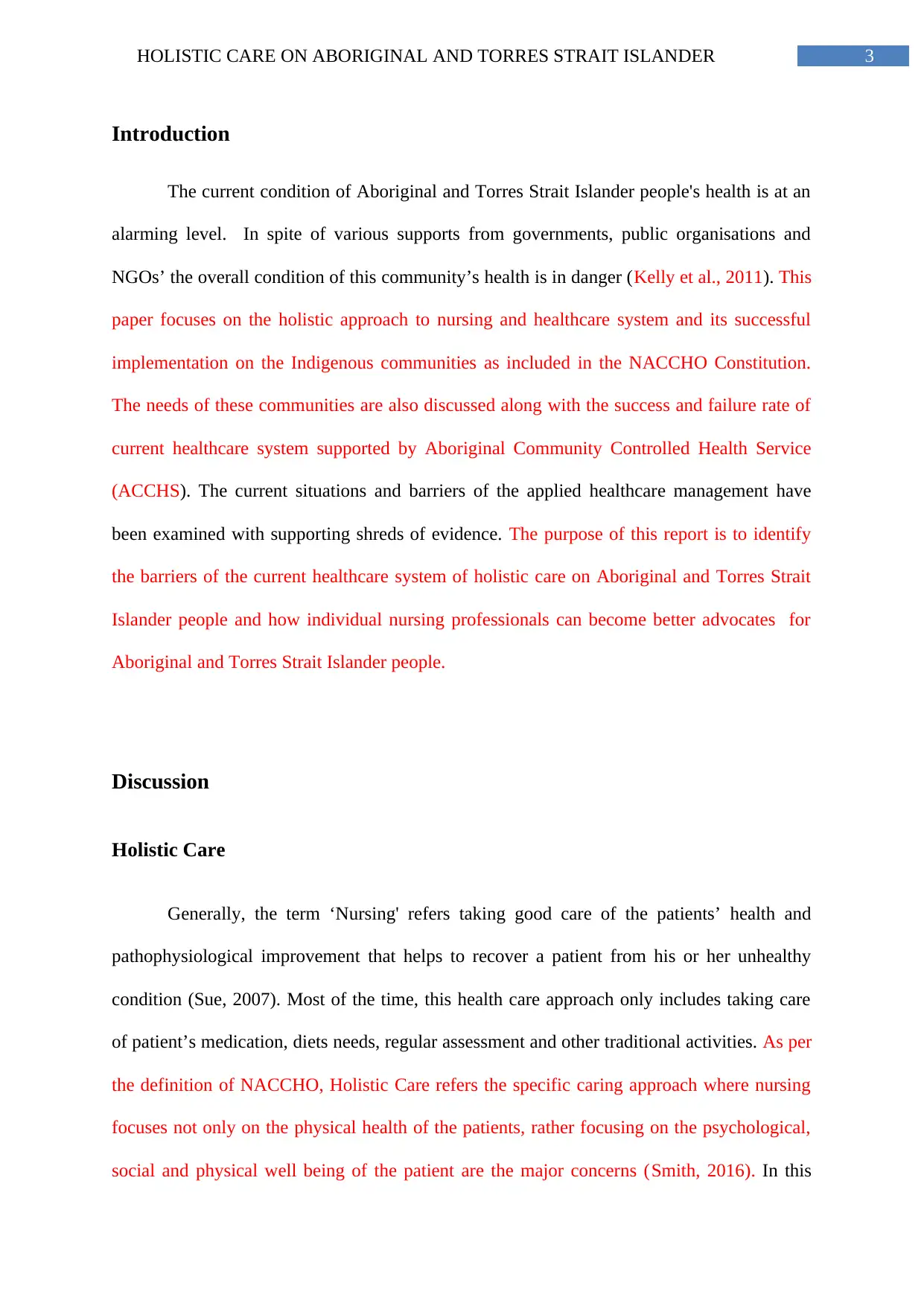
3HOLISTIC CARE ON ABORIGINAL AND TORRES STRAIT ISLANDER
Introduction
The current condition of Aboriginal and Torres Strait Islander people's health is at an
alarming level. In spite of various supports from governments, public organisations and
NGOs’ the overall condition of this community’s health is in danger (Kelly et al., 2011). This
paper focuses on the holistic approach to nursing and healthcare system and its successful
implementation on the Indigenous communities as included in the NACCHO Constitution.
The needs of these communities are also discussed along with the success and failure rate of
current healthcare system supported by Aboriginal Community Controlled Health Service
(ACCHS). The current situations and barriers of the applied healthcare management have
been examined with supporting shreds of evidence. The purpose of this report is to identify
the barriers of the current healthcare system of holistic care on Aboriginal and Torres Strait
Islander people and how individual nursing professionals can become better advocates for
Aboriginal and Torres Strait Islander people.
Discussion
Holistic Care
Generally, the term ‘Nursing' refers taking good care of the patients’ health and
pathophysiological improvement that helps to recover a patient from his or her unhealthy
condition (Sue, 2007). Most of the time, this health care approach only includes taking care
of patient’s medication, diets needs, regular assessment and other traditional activities. As per
the definition of NACCHO, Holistic Care refers the specific caring approach where nursing
focuses not only on the physical health of the patients, rather focusing on the psychological,
social and physical well being of the patient are the major concerns (Smith, 2016). In this
Introduction
The current condition of Aboriginal and Torres Strait Islander people's health is at an
alarming level. In spite of various supports from governments, public organisations and
NGOs’ the overall condition of this community’s health is in danger (Kelly et al., 2011). This
paper focuses on the holistic approach to nursing and healthcare system and its successful
implementation on the Indigenous communities as included in the NACCHO Constitution.
The needs of these communities are also discussed along with the success and failure rate of
current healthcare system supported by Aboriginal Community Controlled Health Service
(ACCHS). The current situations and barriers of the applied healthcare management have
been examined with supporting shreds of evidence. The purpose of this report is to identify
the barriers of the current healthcare system of holistic care on Aboriginal and Torres Strait
Islander people and how individual nursing professionals can become better advocates for
Aboriginal and Torres Strait Islander people.
Discussion
Holistic Care
Generally, the term ‘Nursing' refers taking good care of the patients’ health and
pathophysiological improvement that helps to recover a patient from his or her unhealthy
condition (Sue, 2007). Most of the time, this health care approach only includes taking care
of patient’s medication, diets needs, regular assessment and other traditional activities. As per
the definition of NACCHO, Holistic Care refers the specific caring approach where nursing
focuses not only on the physical health of the patients, rather focusing on the psychological,
social and physical well being of the patient are the major concerns (Smith, 2016). In this
Secure Best Marks with AI Grader
Need help grading? Try our AI Grader for instant feedback on your assignments.
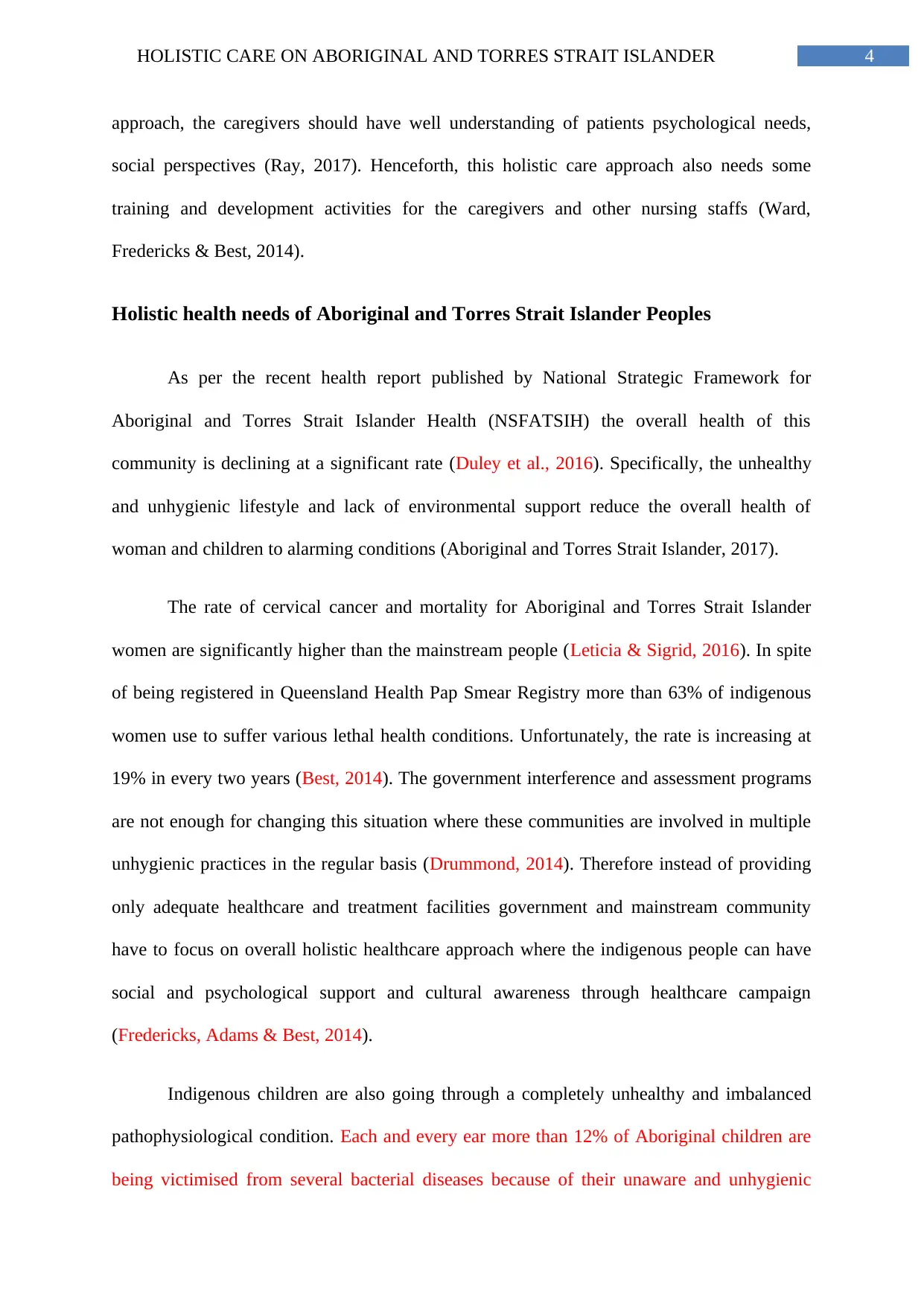
4HOLISTIC CARE ON ABORIGINAL AND TORRES STRAIT ISLANDER
approach, the caregivers should have well understanding of patients psychological needs,
social perspectives (Ray, 2017). Henceforth, this holistic care approach also needs some
training and development activities for the caregivers and other nursing staffs (Ward,
Fredericks & Best, 2014).
Holistic health needs of Aboriginal and Torres Strait Islander Peoples
As per the recent health report published by National Strategic Framework for
Aboriginal and Torres Strait Islander Health (NSFATSIH) the overall health of this
community is declining at a significant rate (Duley et al., 2016). Specifically, the unhealthy
and unhygienic lifestyle and lack of environmental support reduce the overall health of
woman and children to alarming conditions (Aboriginal and Torres Strait Islander, 2017).
The rate of cervical cancer and mortality for Aboriginal and Torres Strait Islander
women are significantly higher than the mainstream people (Leticia & Sigrid, 2016). In spite
of being registered in Queensland Health Pap Smear Registry more than 63% of indigenous
women use to suffer various lethal health conditions. Unfortunately, the rate is increasing at
19% in every two years (Best, 2014). The government interference and assessment programs
are not enough for changing this situation where these communities are involved in multiple
unhygienic practices in the regular basis (Drummond, 2014). Therefore instead of providing
only adequate healthcare and treatment facilities government and mainstream community
have to focus on overall holistic healthcare approach where the indigenous people can have
social and psychological support and cultural awareness through healthcare campaign
(Fredericks, Adams & Best, 2014).
Indigenous children are also going through a completely unhealthy and imbalanced
pathophysiological condition. Each and every ear more than 12% of Aboriginal children are
being victimised from several bacterial diseases because of their unaware and unhygienic
approach, the caregivers should have well understanding of patients psychological needs,
social perspectives (Ray, 2017). Henceforth, this holistic care approach also needs some
training and development activities for the caregivers and other nursing staffs (Ward,
Fredericks & Best, 2014).
Holistic health needs of Aboriginal and Torres Strait Islander Peoples
As per the recent health report published by National Strategic Framework for
Aboriginal and Torres Strait Islander Health (NSFATSIH) the overall health of this
community is declining at a significant rate (Duley et al., 2016). Specifically, the unhealthy
and unhygienic lifestyle and lack of environmental support reduce the overall health of
woman and children to alarming conditions (Aboriginal and Torres Strait Islander, 2017).
The rate of cervical cancer and mortality for Aboriginal and Torres Strait Islander
women are significantly higher than the mainstream people (Leticia & Sigrid, 2016). In spite
of being registered in Queensland Health Pap Smear Registry more than 63% of indigenous
women use to suffer various lethal health conditions. Unfortunately, the rate is increasing at
19% in every two years (Best, 2014). The government interference and assessment programs
are not enough for changing this situation where these communities are involved in multiple
unhygienic practices in the regular basis (Drummond, 2014). Therefore instead of providing
only adequate healthcare and treatment facilities government and mainstream community
have to focus on overall holistic healthcare approach where the indigenous people can have
social and psychological support and cultural awareness through healthcare campaign
(Fredericks, Adams & Best, 2014).
Indigenous children are also going through a completely unhealthy and imbalanced
pathophysiological condition. Each and every ear more than 12% of Aboriginal children are
being victimised from several bacterial diseases because of their unaware and unhygienic
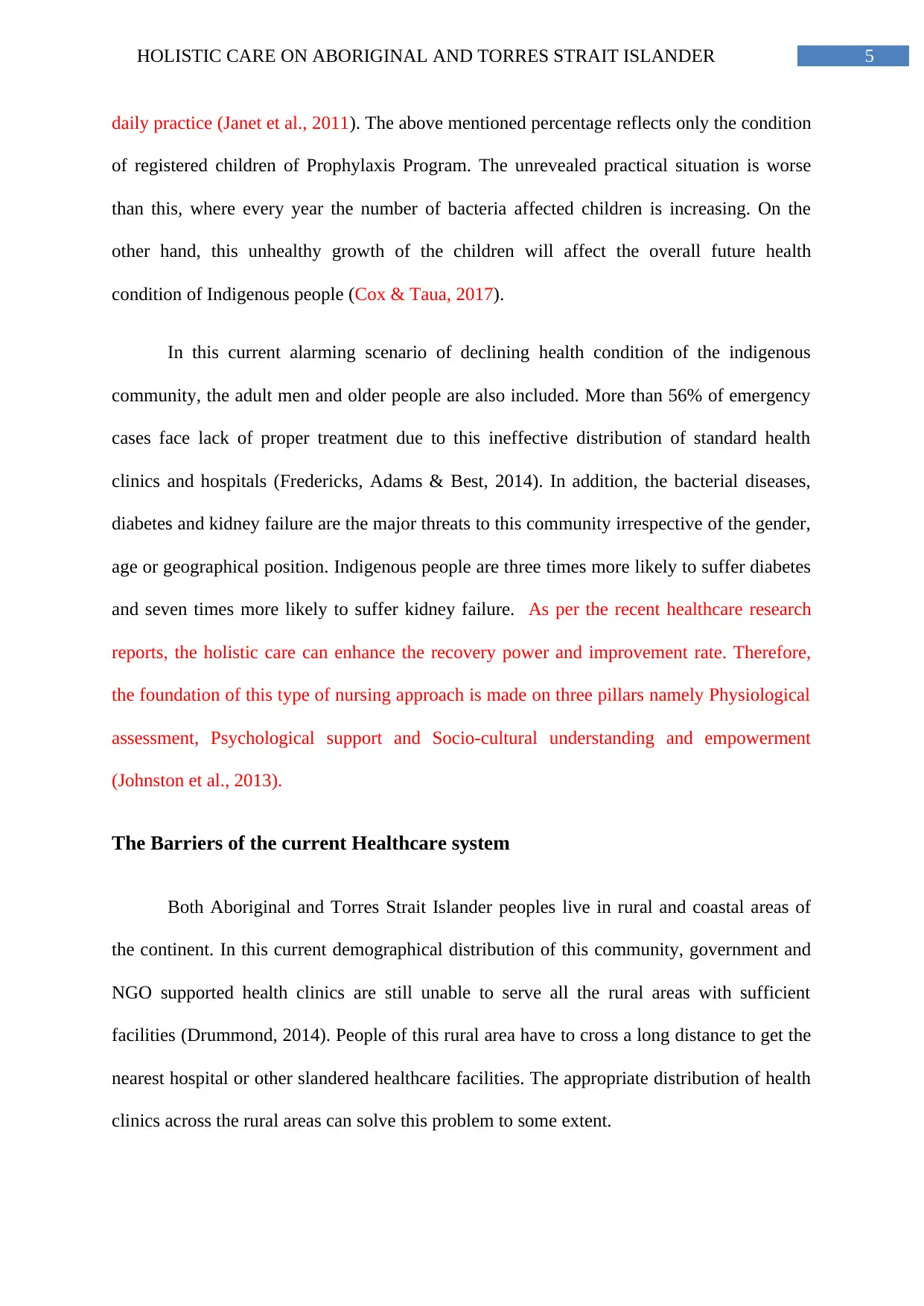
5HOLISTIC CARE ON ABORIGINAL AND TORRES STRAIT ISLANDER
daily practice (Janet et al., 2011). The above mentioned percentage reflects only the condition
of registered children of Prophylaxis Program. The unrevealed practical situation is worse
than this, where every year the number of bacteria affected children is increasing. On the
other hand, this unhealthy growth of the children will affect the overall future health
condition of Indigenous people (Cox & Taua, 2017).
In this current alarming scenario of declining health condition of the indigenous
community, the adult men and older people are also included. More than 56% of emergency
cases face lack of proper treatment due to this ineffective distribution of standard health
clinics and hospitals (Fredericks, Adams & Best, 2014). In addition, the bacterial diseases,
diabetes and kidney failure are the major threats to this community irrespective of the gender,
age or geographical position. Indigenous people are three times more likely to suffer diabetes
and seven times more likely to suffer kidney failure. As per the recent healthcare research
reports, the holistic care can enhance the recovery power and improvement rate. Therefore,
the foundation of this type of nursing approach is made on three pillars namely Physiological
assessment, Psychological support and Socio-cultural understanding and empowerment
(Johnston et al., 2013).
The Barriers of the current Healthcare system
Both Aboriginal and Torres Strait Islander peoples live in rural and coastal areas of
the continent. In this current demographical distribution of this community, government and
NGO supported health clinics are still unable to serve all the rural areas with sufficient
facilities (Drummond, 2014). People of this rural area have to cross a long distance to get the
nearest hospital or other slandered healthcare facilities. The appropriate distribution of health
clinics across the rural areas can solve this problem to some extent.
daily practice (Janet et al., 2011). The above mentioned percentage reflects only the condition
of registered children of Prophylaxis Program. The unrevealed practical situation is worse
than this, where every year the number of bacteria affected children is increasing. On the
other hand, this unhealthy growth of the children will affect the overall future health
condition of Indigenous people (Cox & Taua, 2017).
In this current alarming scenario of declining health condition of the indigenous
community, the adult men and older people are also included. More than 56% of emergency
cases face lack of proper treatment due to this ineffective distribution of standard health
clinics and hospitals (Fredericks, Adams & Best, 2014). In addition, the bacterial diseases,
diabetes and kidney failure are the major threats to this community irrespective of the gender,
age or geographical position. Indigenous people are three times more likely to suffer diabetes
and seven times more likely to suffer kidney failure. As per the recent healthcare research
reports, the holistic care can enhance the recovery power and improvement rate. Therefore,
the foundation of this type of nursing approach is made on three pillars namely Physiological
assessment, Psychological support and Socio-cultural understanding and empowerment
(Johnston et al., 2013).
The Barriers of the current Healthcare system
Both Aboriginal and Torres Strait Islander peoples live in rural and coastal areas of
the continent. In this current demographical distribution of this community, government and
NGO supported health clinics are still unable to serve all the rural areas with sufficient
facilities (Drummond, 2014). People of this rural area have to cross a long distance to get the
nearest hospital or other slandered healthcare facilities. The appropriate distribution of health
clinics across the rural areas can solve this problem to some extent.
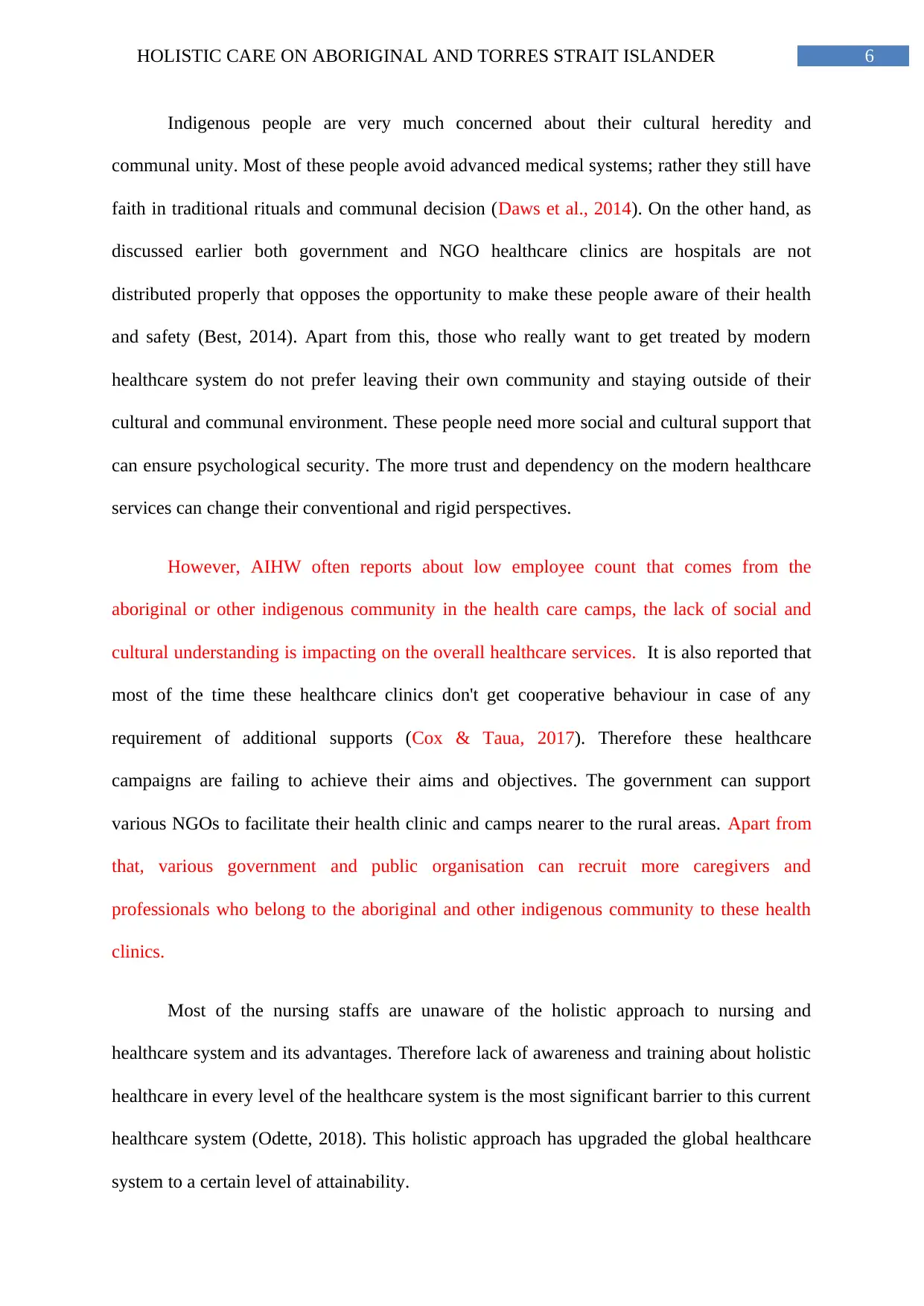
6HOLISTIC CARE ON ABORIGINAL AND TORRES STRAIT ISLANDER
Indigenous people are very much concerned about their cultural heredity and
communal unity. Most of these people avoid advanced medical systems; rather they still have
faith in traditional rituals and communal decision (Daws et al., 2014). On the other hand, as
discussed earlier both government and NGO healthcare clinics are hospitals are not
distributed properly that opposes the opportunity to make these people aware of their health
and safety (Best, 2014). Apart from this, those who really want to get treated by modern
healthcare system do not prefer leaving their own community and staying outside of their
cultural and communal environment. These people need more social and cultural support that
can ensure psychological security. The more trust and dependency on the modern healthcare
services can change their conventional and rigid perspectives.
However, AIHW often reports about low employee count that comes from the
aboriginal or other indigenous community in the health care camps, the lack of social and
cultural understanding is impacting on the overall healthcare services. It is also reported that
most of the time these healthcare clinics don't get cooperative behaviour in case of any
requirement of additional supports (Cox & Taua, 2017). Therefore these healthcare
campaigns are failing to achieve their aims and objectives. The government can support
various NGOs to facilitate their health clinic and camps nearer to the rural areas. Apart from
that, various government and public organisation can recruit more caregivers and
professionals who belong to the aboriginal and other indigenous community to these health
clinics.
Most of the nursing staffs are unaware of the holistic approach to nursing and
healthcare system and its advantages. Therefore lack of awareness and training about holistic
healthcare in every level of the healthcare system is the most significant barrier to this current
healthcare system (Odette, 2018). This holistic approach has upgraded the global healthcare
system to a certain level of attainability.
Indigenous people are very much concerned about their cultural heredity and
communal unity. Most of these people avoid advanced medical systems; rather they still have
faith in traditional rituals and communal decision (Daws et al., 2014). On the other hand, as
discussed earlier both government and NGO healthcare clinics are hospitals are not
distributed properly that opposes the opportunity to make these people aware of their health
and safety (Best, 2014). Apart from this, those who really want to get treated by modern
healthcare system do not prefer leaving their own community and staying outside of their
cultural and communal environment. These people need more social and cultural support that
can ensure psychological security. The more trust and dependency on the modern healthcare
services can change their conventional and rigid perspectives.
However, AIHW often reports about low employee count that comes from the
aboriginal or other indigenous community in the health care camps, the lack of social and
cultural understanding is impacting on the overall healthcare services. It is also reported that
most of the time these healthcare clinics don't get cooperative behaviour in case of any
requirement of additional supports (Cox & Taua, 2017). Therefore these healthcare
campaigns are failing to achieve their aims and objectives. The government can support
various NGOs to facilitate their health clinic and camps nearer to the rural areas. Apart from
that, various government and public organisation can recruit more caregivers and
professionals who belong to the aboriginal and other indigenous community to these health
clinics.
Most of the nursing staffs are unaware of the holistic approach to nursing and
healthcare system and its advantages. Therefore lack of awareness and training about holistic
healthcare in every level of the healthcare system is the most significant barrier to this current
healthcare system (Odette, 2018). This holistic approach has upgraded the global healthcare
system to a certain level of attainability.
Paraphrase This Document
Need a fresh take? Get an instant paraphrase of this document with our AI Paraphraser
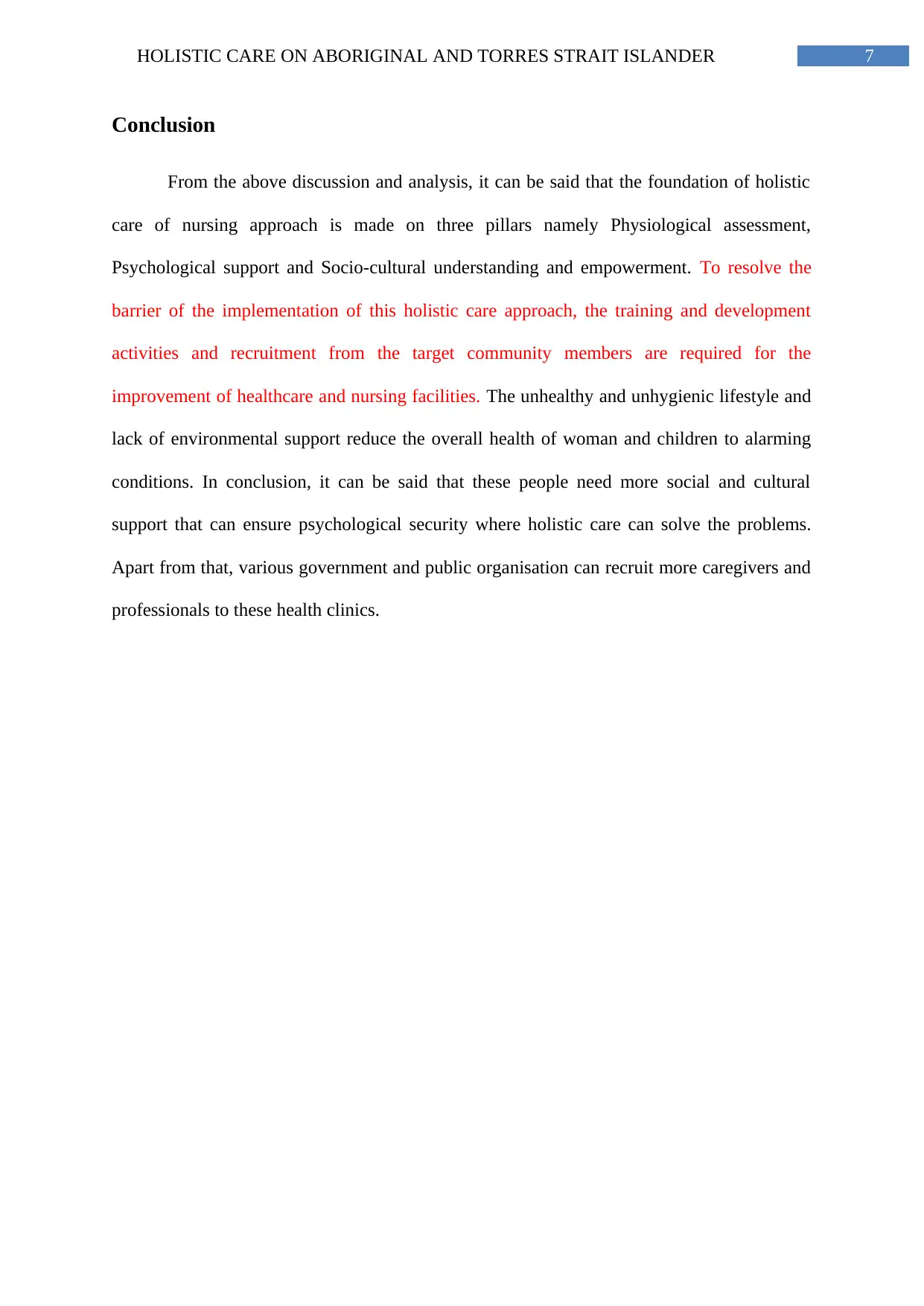
7HOLISTIC CARE ON ABORIGINAL AND TORRES STRAIT ISLANDER
Conclusion
From the above discussion and analysis, it can be said that the foundation of holistic
care of nursing approach is made on three pillars namely Physiological assessment,
Psychological support and Socio-cultural understanding and empowerment. To resolve the
barrier of the implementation of this holistic care approach, the training and development
activities and recruitment from the target community members are required for the
improvement of healthcare and nursing facilities. The unhealthy and unhygienic lifestyle and
lack of environmental support reduce the overall health of woman and children to alarming
conditions. In conclusion, it can be said that these people need more social and cultural
support that can ensure psychological security where holistic care can solve the problems.
Apart from that, various government and public organisation can recruit more caregivers and
professionals to these health clinics.
Conclusion
From the above discussion and analysis, it can be said that the foundation of holistic
care of nursing approach is made on three pillars namely Physiological assessment,
Psychological support and Socio-cultural understanding and empowerment. To resolve the
barrier of the implementation of this holistic care approach, the training and development
activities and recruitment from the target community members are required for the
improvement of healthcare and nursing facilities. The unhealthy and unhygienic lifestyle and
lack of environmental support reduce the overall health of woman and children to alarming
conditions. In conclusion, it can be said that these people need more social and cultural
support that can ensure psychological security where holistic care can solve the problems.
Apart from that, various government and public organisation can recruit more caregivers and
professionals to these health clinics.
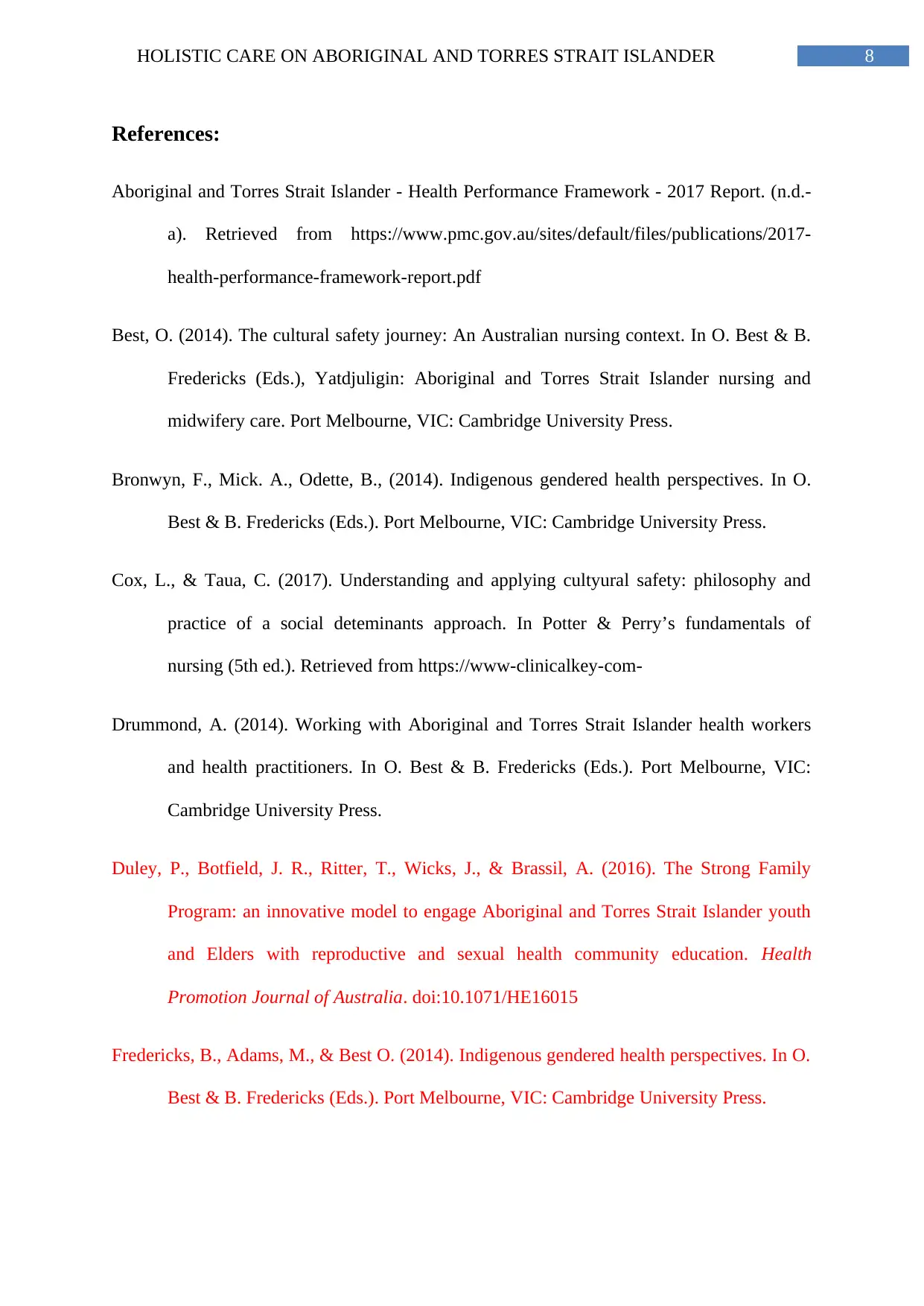
8HOLISTIC CARE ON ABORIGINAL AND TORRES STRAIT ISLANDER
References:
Aboriginal and Torres Strait Islander - Health Performance Framework - 2017 Report. (n.d.-
a). Retrieved from https://www.pmc.gov.au/sites/default/files/publications/2017-
health-performance-framework-report.pdf
Best, O. (2014). The cultural safety journey: An Australian nursing context. In O. Best & B.
Fredericks (Eds.), Yatdjuligin: Aboriginal and Torres Strait Islander nursing and
midwifery care. Port Melbourne, VIC: Cambridge University Press.
Bronwyn, F., Mick. A., Odette, B., (2014). Indigenous gendered health perspectives. In O.
Best & B. Fredericks (Eds.). Port Melbourne, VIC: Cambridge University Press.
Cox, L., & Taua, C. (2017). Understanding and applying cultyural safety: philosophy and
practice of a social deteminants approach. In Potter & Perry’s fundamentals of
nursing (5th ed.). Retrieved from https://www-clinicalkey-com-
Drummond, A. (2014). Working with Aboriginal and Torres Strait Islander health workers
and health practitioners. In O. Best & B. Fredericks (Eds.). Port Melbourne, VIC:
Cambridge University Press.
Duley, P., Botfield, J. R., Ritter, T., Wicks, J., & Brassil, A. (2016). The Strong Family
Program: an innovative model to engage Aboriginal and Torres Strait Islander youth
and Elders with reproductive and sexual health community education. Health
Promotion Journal of Australia. doi:10.1071/HE16015
Fredericks, B., Adams, M., & Best O. (2014). Indigenous gendered health perspectives. In O.
Best & B. Fredericks (Eds.). Port Melbourne, VIC: Cambridge University Press.
References:
Aboriginal and Torres Strait Islander - Health Performance Framework - 2017 Report. (n.d.-
a). Retrieved from https://www.pmc.gov.au/sites/default/files/publications/2017-
health-performance-framework-report.pdf
Best, O. (2014). The cultural safety journey: An Australian nursing context. In O. Best & B.
Fredericks (Eds.), Yatdjuligin: Aboriginal and Torres Strait Islander nursing and
midwifery care. Port Melbourne, VIC: Cambridge University Press.
Bronwyn, F., Mick. A., Odette, B., (2014). Indigenous gendered health perspectives. In O.
Best & B. Fredericks (Eds.). Port Melbourne, VIC: Cambridge University Press.
Cox, L., & Taua, C. (2017). Understanding and applying cultyural safety: philosophy and
practice of a social deteminants approach. In Potter & Perry’s fundamentals of
nursing (5th ed.). Retrieved from https://www-clinicalkey-com-
Drummond, A. (2014). Working with Aboriginal and Torres Strait Islander health workers
and health practitioners. In O. Best & B. Fredericks (Eds.). Port Melbourne, VIC:
Cambridge University Press.
Duley, P., Botfield, J. R., Ritter, T., Wicks, J., & Brassil, A. (2016). The Strong Family
Program: an innovative model to engage Aboriginal and Torres Strait Islander youth
and Elders with reproductive and sexual health community education. Health
Promotion Journal of Australia. doi:10.1071/HE16015
Fredericks, B., Adams, M., & Best O. (2014). Indigenous gendered health perspectives. In O.
Best & B. Fredericks (Eds.). Port Melbourne, VIC: Cambridge University Press.
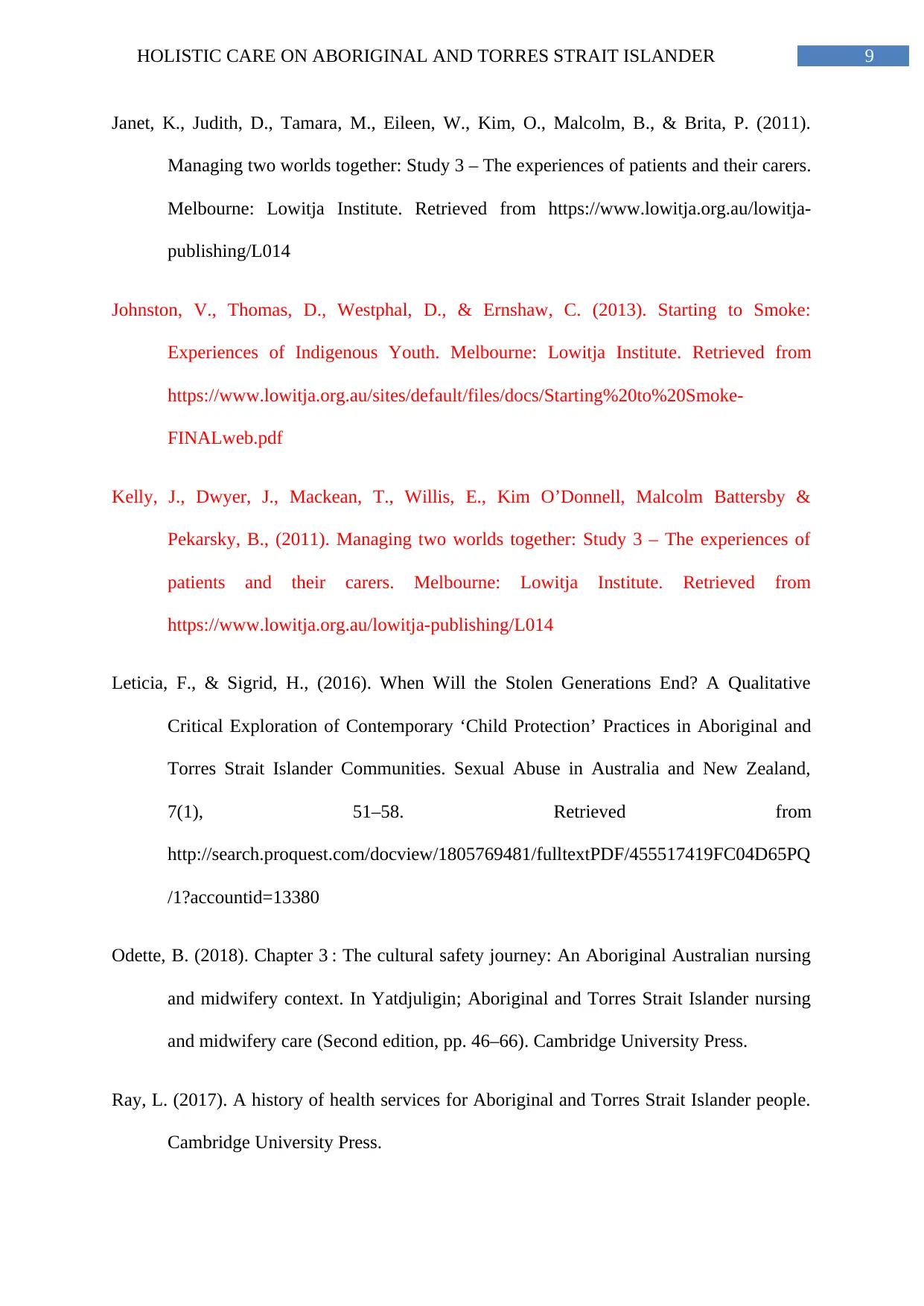
9HOLISTIC CARE ON ABORIGINAL AND TORRES STRAIT ISLANDER
Janet, K., Judith, D., Tamara, M., Eileen, W., Kim, O., Malcolm, B., & Brita, P. (2011).
Managing two worlds together: Study 3 – The experiences of patients and their carers.
Melbourne: Lowitja Institute. Retrieved from https://www.lowitja.org.au/lowitja-
publishing/L014
Johnston, V., Thomas, D., Westphal, D., & Ernshaw, C. (2013). Starting to Smoke:
Experiences of Indigenous Youth. Melbourne: Lowitja Institute. Retrieved from
https://www.lowitja.org.au/sites/default/files/docs/Starting%20to%20Smoke-
FINALweb.pdf
Kelly, J., Dwyer, J., Mackean, T., Willis, E., Kim O’Donnell, Malcolm Battersby &
Pekarsky, B., (2011). Managing two worlds together: Study 3 – The experiences of
patients and their carers. Melbourne: Lowitja Institute. Retrieved from
https://www.lowitja.org.au/lowitja-publishing/L014
Leticia, F., & Sigrid, H., (2016). When Will the Stolen Generations End? A Qualitative
Critical Exploration of Contemporary ‘Child Protection’ Practices in Aboriginal and
Torres Strait Islander Communities. Sexual Abuse in Australia and New Zealand,
7(1), 51–58. Retrieved from
http://search.proquest.com/docview/1805769481/fulltextPDF/455517419FC04D65PQ
/1?accountid=13380
Odette, B. (2018). Chapter 3 : The cultural safety journey: An Aboriginal Australian nursing
and midwifery context. In Yatdjuligin; Aboriginal and Torres Strait Islander nursing
and midwifery care (Second edition, pp. 46–66). Cambridge University Press.
Ray, L. (2017). A history of health services for Aboriginal and Torres Strait Islander people.
Cambridge University Press.
Janet, K., Judith, D., Tamara, M., Eileen, W., Kim, O., Malcolm, B., & Brita, P. (2011).
Managing two worlds together: Study 3 – The experiences of patients and their carers.
Melbourne: Lowitja Institute. Retrieved from https://www.lowitja.org.au/lowitja-
publishing/L014
Johnston, V., Thomas, D., Westphal, D., & Ernshaw, C. (2013). Starting to Smoke:
Experiences of Indigenous Youth. Melbourne: Lowitja Institute. Retrieved from
https://www.lowitja.org.au/sites/default/files/docs/Starting%20to%20Smoke-
FINALweb.pdf
Kelly, J., Dwyer, J., Mackean, T., Willis, E., Kim O’Donnell, Malcolm Battersby &
Pekarsky, B., (2011). Managing two worlds together: Study 3 – The experiences of
patients and their carers. Melbourne: Lowitja Institute. Retrieved from
https://www.lowitja.org.au/lowitja-publishing/L014
Leticia, F., & Sigrid, H., (2016). When Will the Stolen Generations End? A Qualitative
Critical Exploration of Contemporary ‘Child Protection’ Practices in Aboriginal and
Torres Strait Islander Communities. Sexual Abuse in Australia and New Zealand,
7(1), 51–58. Retrieved from
http://search.proquest.com/docview/1805769481/fulltextPDF/455517419FC04D65PQ
/1?accountid=13380
Odette, B. (2018). Chapter 3 : The cultural safety journey: An Aboriginal Australian nursing
and midwifery context. In Yatdjuligin; Aboriginal and Torres Strait Islander nursing
and midwifery care (Second edition, pp. 46–66). Cambridge University Press.
Ray, L. (2017). A history of health services for Aboriginal and Torres Strait Islander people.
Cambridge University Press.
Secure Best Marks with AI Grader
Need help grading? Try our AI Grader for instant feedback on your assignments.
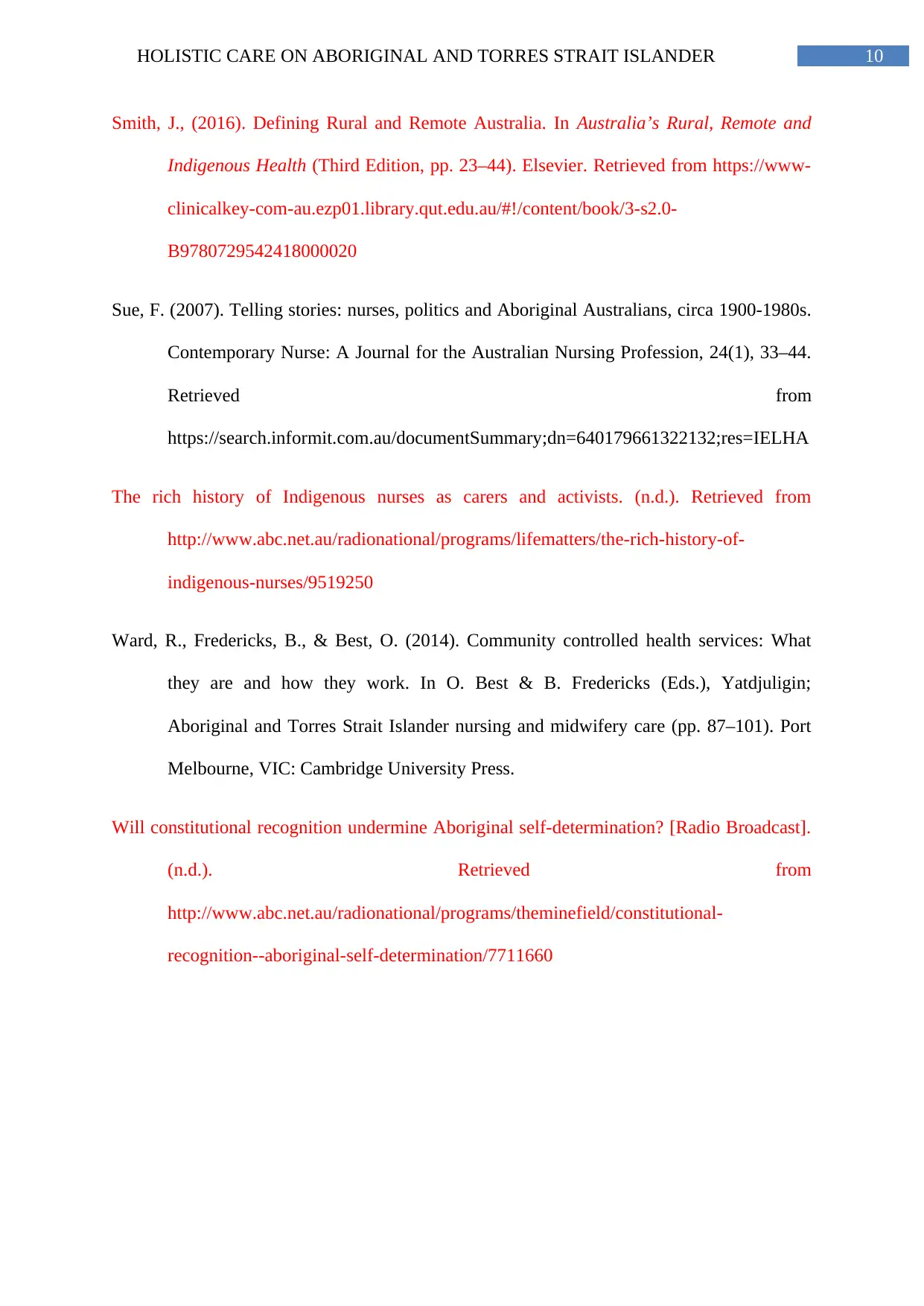
10HOLISTIC CARE ON ABORIGINAL AND TORRES STRAIT ISLANDER
Smith, J., (2016). Defining Rural and Remote Australia. In Australia’s Rural, Remote and
Indigenous Health (Third Edition, pp. 23–44). Elsevier. Retrieved from https://www-
clinicalkey-com-au.ezp01.library.qut.edu.au/#!/content/book/3-s2.0-
B9780729542418000020
Sue, F. (2007). Telling stories: nurses, politics and Aboriginal Australians, circa 1900-1980s.
Contemporary Nurse: A Journal for the Australian Nursing Profession, 24(1), 33–44.
Retrieved from
https://search.informit.com.au/documentSummary;dn=640179661322132;res=IELHA
The rich history of Indigenous nurses as carers and activists. (n.d.). Retrieved from
http://www.abc.net.au/radionational/programs/lifematters/the-rich-history-of-
indigenous-nurses/9519250
Ward, R., Fredericks, B., & Best, O. (2014). Community controlled health services: What
they are and how they work. In O. Best & B. Fredericks (Eds.), Yatdjuligin;
Aboriginal and Torres Strait Islander nursing and midwifery care (pp. 87–101). Port
Melbourne, VIC: Cambridge University Press.
Will constitutional recognition undermine Aboriginal self-determination? [Radio Broadcast].
(n.d.). Retrieved from
http://www.abc.net.au/radionational/programs/theminefield/constitutional-
recognition--aboriginal-self-determination/7711660
Smith, J., (2016). Defining Rural and Remote Australia. In Australia’s Rural, Remote and
Indigenous Health (Third Edition, pp. 23–44). Elsevier. Retrieved from https://www-
clinicalkey-com-au.ezp01.library.qut.edu.au/#!/content/book/3-s2.0-
B9780729542418000020
Sue, F. (2007). Telling stories: nurses, politics and Aboriginal Australians, circa 1900-1980s.
Contemporary Nurse: A Journal for the Australian Nursing Profession, 24(1), 33–44.
Retrieved from
https://search.informit.com.au/documentSummary;dn=640179661322132;res=IELHA
The rich history of Indigenous nurses as carers and activists. (n.d.). Retrieved from
http://www.abc.net.au/radionational/programs/lifematters/the-rich-history-of-
indigenous-nurses/9519250
Ward, R., Fredericks, B., & Best, O. (2014). Community controlled health services: What
they are and how they work. In O. Best & B. Fredericks (Eds.), Yatdjuligin;
Aboriginal and Torres Strait Islander nursing and midwifery care (pp. 87–101). Port
Melbourne, VIC: Cambridge University Press.
Will constitutional recognition undermine Aboriginal self-determination? [Radio Broadcast].
(n.d.). Retrieved from
http://www.abc.net.au/radionational/programs/theminefield/constitutional-
recognition--aboriginal-self-determination/7711660
1 out of 11
Your All-in-One AI-Powered Toolkit for Academic Success.
+13062052269
info@desklib.com
Available 24*7 on WhatsApp / Email
![[object Object]](/_next/static/media/star-bottom.7253800d.svg)
Unlock your academic potential
© 2024 | Zucol Services PVT LTD | All rights reserved.




